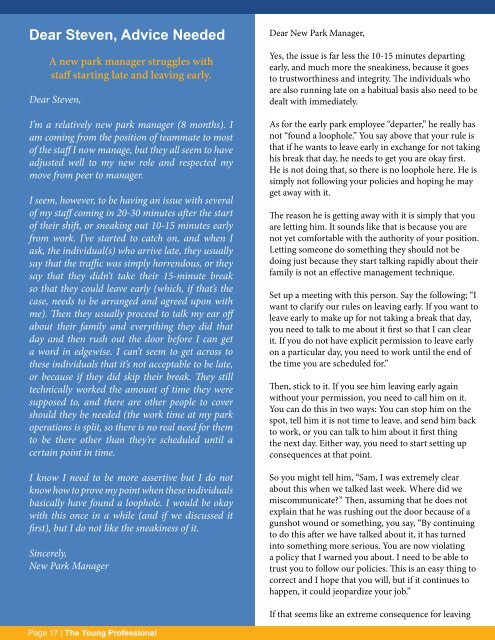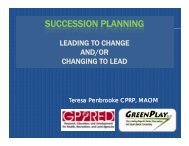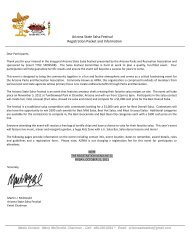The Young Professional 1 - Arizona Parks and Recreation Association
The Young Professional 1 - Arizona Parks and Recreation Association
The Young Professional 1 - Arizona Parks and Recreation Association
Create successful ePaper yourself
Turn your PDF publications into a flip-book with our unique Google optimized e-Paper software.
Dear Steven, Advice NeededA new park manager struggles withstaff starting late <strong>and</strong> leaving early.Dear Steven,I’m a relatively new park manager (8 months). Iam coming from the position of teammate to mostof the staff I now manage, but they all seem to haveadjusted well to my new role <strong>and</strong> respected mymove from peer to manager.I seem, however, to be having an issue with severalof my staff coming in 20-30 minutes after the startof their shift, or sneaking out 10-15 minutes earlyfrom work. I’ve started to catch on, <strong>and</strong> when Iask, the individual(s) who arrive late, they usuallysay that the traffic was simply horrendous, or theysay that they didn’t take their 15-minute breakso that they could leave early (which, if that’s thecase, needs to be arranged <strong>and</strong> agreed upon withme). <strong>The</strong>n they usually proceed to talk my ear offabout their family <strong>and</strong> everything they did thatday <strong>and</strong> then rush out the door before I can geta word in edgewise. I can’t seem to get across tothese individuals that it’s not acceptable to be late,or because if they did skip their break. <strong>The</strong>y stilltechnically worked the amount of time they weresupposed to, <strong>and</strong> there are other people to covershould they be needed (the work time at my parkoperations is split, so there is no real need for themto be there other than they’re scheduled until acertain point in time.I know I need to be more assertive but I do notknow how to prove my point when these individualsbasically have found a loophole. I would be okaywith this once in a while (<strong>and</strong> if we discussed itfirst), but I do not like the sneakiness of it.Sincerely,New Park ManagerDear New Park Manager,Yes, the issue is far less the 10-15 minutes departingearly, <strong>and</strong> much more the sneakiness, because it goesto trustworthiness <strong>and</strong> integrity. <strong>The</strong> individuals whoare also running late on a habitual basis also need to bedealt with immediately.As for the early park employee “departer,” he really hasnot “found a loophole.” You say above that your rule isthat if he wants to leave early in exchange for not takinghis break that day, he needs to get you are okay first.He is not doing that, so there is no loophole here. He issimply not following your policies <strong>and</strong> hoping he mayget away with it.<strong>The</strong> reason he is getting away with it is simply that youare letting him. It sounds like that is because you arenot yet comfortable with the authority of your position.Letting someone do something they should not bedoing just because they start talking rapidly about theirfamily is not an effective management technique.Set up a meeting with this person. Say the following; “Iwant to clarify our rules on leaving early. If you want toleave early to make up for not taking a break that day,you need to talk to me about it first so that I can clearit. If you do not have explicit permission to leave earlyon a particular day, you need to work until the end ofthe time you are scheduled for.”<strong>The</strong>n, stick to it. If you see him leaving early againwithout your permission, you need to call him on it.You can do this in two ways: You can stop him on thespot, tell him it is not time to leave, <strong>and</strong> send him backto work, or you can talk to him about it first thingthe next day. Either way, you need to start setting upconsequences at that point.So you might tell him, “Sam, I was extremely clearabout this when we talked last week. Where did wemiscommunicate?” <strong>The</strong>n, assuming that he does notexplain that he was rushing out the door because of agunshot wound or something, you say, “By continuingto do this after we have talked about it, it has turnedinto something more serious. You are now violatinga policy that I warned you about. I need to be able totrust you to follow our policies. This is an easy thing tocorrect <strong>and</strong> I hope that you will, but if it continues tohappen, it could jeopardize your job.”If that seems like an extreme consequence for leavingPage 17 | <strong>The</strong> <strong>Young</strong> <strong>Professional</strong>










